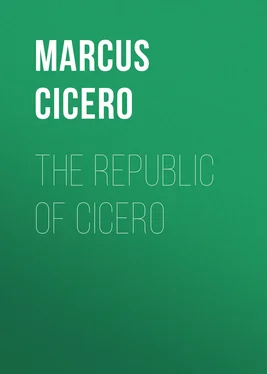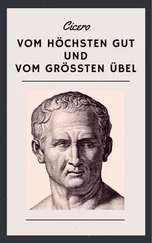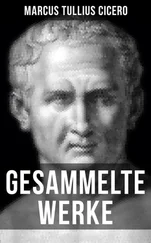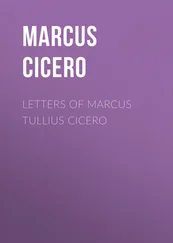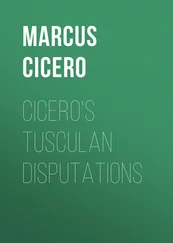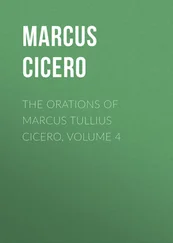Marcus Cicero - The republic of Cicero
Здесь есть возможность читать онлайн «Marcus Cicero - The republic of Cicero» — ознакомительный отрывок электронной книги совершенно бесплатно, а после прочтения отрывка купить полную версию. В некоторых случаях можно слушать аудио, скачать через торрент в формате fb2 и присутствует краткое содержание. Жанр: foreign_antique, Философия, foreign_edu, на английском языке. Описание произведения, (предисловие) а так же отзывы посетителей доступны на портале библиотеки ЛибКат.
- Название:The republic of Cicero
- Автор:
- Жанр:
- Год:неизвестен
- ISBN:нет данных
- Рейтинг книги:5 / 5. Голосов: 1
-
Избранное:Добавить в избранное
- Отзывы:
-
Ваша оценка:
- 100
- 1
- 2
- 3
- 4
- 5
The republic of Cicero: краткое содержание, описание и аннотация
Предлагаем к чтению аннотацию, описание, краткое содержание или предисловие (зависит от того, что написал сам автор книги «The republic of Cicero»). Если вы не нашли необходимую информацию о книге — напишите в комментариях, мы постараемся отыскать её.
The republic of Cicero — читать онлайн ознакомительный отрывок
Ниже представлен текст книги, разбитый по страницам. Система сохранения места последней прочитанной страницы, позволяет с удобством читать онлайн бесплатно книгу «The republic of Cicero», без необходимости каждый раз заново искать на чём Вы остановились. Поставьте закладку, и сможете в любой момент перейти на страницу, на которой закончили чтение.
Интервал:
Закладка:
3 3 Dio. 11. 8. Gellius xv. 27.But the splendid military government which soon grew up, gave both state employment and riches to that class once distinguished for their industry and frugality. Agriculture was abandoned to slaves, and men branded for crimes: it was no longer deemed an honourable employment. Luxury and habits of profusion made it necessary for conspicuous men to acquire the means of indulging in them, at the expense of principle and patriotism. At length when sensual gratifications became dearer to a majority of the Romans than liberty, the republic was overthrown, and military despotism accomplished the circle of military influence; extinguished every spark of light and liberty; stripped the empire of its moral and physical power, and left it unmindful of its past glorious existence, to perish in a blind and helpless old age.
Marcus Tullius Cicero was born at Arpinum, a city of the Samnites, which had long enjoyed the freedom of Rome. His family was an ancient one, and of the equestrian order; which comprehended the most respectable gentry of the empire, who were only inferior in rank to the patricians. Having assumed the manly gown at his sixteenth year, he immediately began to acquire a knowledge of the laws of his country, under the two Scævolas, eminent persons of that day. The Marsian war, and the civil broils of Marius and Sylla, the former of whom was also a native of Arpinum, occurred during the prosecution of his civil studies; and although they gave some interruption to them, yet these violent contentions falling immediately under his observation, he became at an early period accustomed to consider the political situation of his country. These circumstances no doubt had some influence in deciding his future career; although the rare natural activity of his mind would perhaps have led him under any situation to the investigation of all moral and physical relations. Prompted by this impulse, he now began the study of Grecian philosophy under the learned Athenians who fled to Rome from the persecutions of Mithridates, and afterwards perfected himself in it under Molo the Rhodian; a man so distinguished, that he was permitted to address the Roman Senate in the Greek tongue without an interpreter. About the age of twenty-six, with his mind filled with all the knowledge taught at that period, he first began to plead at the Forum. His celebrated successful defence of S. Roscius was made soon after, in which he braved, what the other Roman orators had not dared to do, the resentment of Sylla. By this bold measure, the generosity of his character, as well as the force of his talents, were developed, and his reputation established as the most powerful orator of Rome. He visited Athens not long after this period, partly to avoid the displeasure of Sylla, and partly to renew the study of philosophy, which he here pursued with great ardour. His friend Atticus, who was at Athens at the same time, had embraced the Epicurean doctrines; but Cicero appears at this early period to have believed in a future state; a doctrine which at a later period he has most eloquently recorded in his celebrated Dream of Scipio. At the end of two years, he returned to Rome, greatly improved by his intercourse with the philosophers and orators of Greece and Asia.
In his thirty-first year, and not long after his marriage, he was elected to the quæstorship, which opened his way to the Senate. One of the provinces of Sicily fell to him by lot, and he exercised his quæstorial functions with such moderation and ability, as to induce the Sicilians to confer extraordinary honours upon him at the termination of his year; when he returned to Rome, determined henceforward to withdraw himself as little as possible from the eyes of the Roman people. In his thirty-seventh year he received the unanimous suffrages of all the tribes for the edileship, which introduced him into the magistracy. The exhibition of the shows and games, which was the province of the ediles, was conducted by Cicero with great satisfaction to the people, and without injuring materially his own private fortune. In this he achieved a difficult point, which marks his great prudence and address. So great had the affection of the people now become for him, that at three different elections for prætor, he was each time placed at the head of the list by the unanimous vote of all the centuries. In his forty-third year, having been very diligent in strengthening his interest, he became a candidate for the consulship with others; among whom were L. Sergius Cataline: but such was his popularity that he was saluted consul by acclamation of the people before the votes were counted. He received also a strong support from the patricians, who had uniformly been opposed to his advancement; but Cicero’s reputation for knowledge and probity was so great, and the times were becoming so critical, that they deemed the government safe in his hands. The patricians at this time were of the faction of Sylla, to which also Cataline belonged: and the Tribunes and the people were of the Marian faction; at the head of which was Julius Cæsar, a near relation to Marius. Although Cæsar, and Cicero were both on the popular side, yet they were not united upon any common principles of order. Cæsar was always individually opposed to him: and when Cicero being consul, was endeavouring in the senate to bring the associates of Cataline to punishment; Cæsar defended them, and even indirectly encouraged their cause, by declaring his disbelief in the immortality of the soul. The suppression of this conspiracy of Cataline, Cethegus, Lentulus and many others, among whom Cæsar was generally numbered, raised the reputation of Cicero to the greatest height. By his incessant vigilance, Rome was saved from the horrors of a general massacre and pillage. The greatest honours were paid him by the senate and equestrian order: and for the first time the sublime epithet of “Father of his Country” was addressed to a Roman citizen in the senate, in the person of Cicero. 4 4 Roma patrem patriæ Ciceronem libera dixit. Juv. 8.
This great action of his life he most feelingly alludes to in the introduction to his first book of the Republic. “Nor is my name forgotten,” &c. The feelings too which the circumstances attending the very last act of his consulship excited in him, are eloquently pourtrayed in a passage immediately following. It was the custom for the consul at the expiration of his office, to make a speech in the assembly of the people, and to swear that he had executed his duties with fidelity. When he was already in the rostra, and was about to address the whole people assembled on this interesting occasion; Metellus, a new tribune, prompted by the officious spirit of popular authority, which often delights to mortify the great and good, forbade the consul to address the people, alleging that Cicero having caused Lentulus and the rest to suffer death without being heard in their defence, did not deserve to be heard himself. Whereat with an enthusiastic presence of mind peculiar to himself, he swore with a loud voice that he had saved the republic: and the multitude moved by a generous feeling which the demagogues had no time to tamper with, more than atoned to him for the intended affront from their tribune, by a simultaneous shout that he had sworn nothing but the truth, 5 5 Magna Voce me vere jurasse juravit. Ep. fam. 5. 2.
and by accompanying him from the Forum to his own house.
Интервал:
Закладка:
Похожие книги на «The republic of Cicero»
Представляем Вашему вниманию похожие книги на «The republic of Cicero» списком для выбора. Мы отобрали схожую по названию и смыслу литературу в надежде предоставить читателям больше вариантов отыскать новые, интересные, ещё непрочитанные произведения.
Обсуждение, отзывы о книге «The republic of Cicero» и просто собственные мнения читателей. Оставьте ваши комментарии, напишите, что Вы думаете о произведении, его смысле или главных героях. Укажите что конкретно понравилось, а что нет, и почему Вы так считаете.
